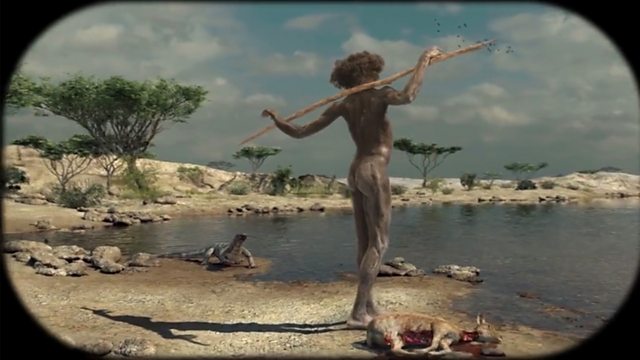Homo erectus
Melvyn Bragg and guests discuss one of our ancestors whose span on Earth extended at least five times more than Homo sapiens has so far, and who was found from Africa to Asia.
Melvyn Bragg and guests discuss one of our ancestors, Homo erectus, who thrived on Earth for around two million years whereas we, Homo sapiens, emerged only in the last three hundred thousand years. Homo erectus, or Upright Man, spread from Africa to Asia and it was on the Island of Java that fossilised remains were found in 1891 in an expedition led by Dutch scientist Eugène Dubois. Homo erectus people adapted to different habitats, ate varied food, lived in groups, had stamina to outrun their prey; and discoveries have prompted many theories on the relationship between their diet and the size of their brains, on their ability as seafarers, on their creativity and on their ability to speak and otherwise communicate.
The image above is from a diorama at the Moesgaard Museum in Denmark, depicting the Turkana Boy referred to in the programme.
With
Peter Kjærgaard
Director of the Natural History Museum of Denmark and Professor of Evolutionary History at the University of Copenhagen
José Joordens
Senior Researcher in Human Evolution at Naturalis Biodiversity Centre and Professor of Human Evolution at Maastricht University
And
Mark Maslin
Professor of Earth System Science at University College London
Producer: Simon Tillotson
Last on
More episodes
Previous
Next
LINKS AND FURTHER READING
Mark Maslin at University College London
Peter Kjærgaard at the Natural History Museum of Denmark
Jose Joordens at Maastricht University
READING LIST
Peter C. Kjærgaard, Mark Maslin and Djuke Veldhuis, ‘Human Evolution: Theory and Progress’ (ResearchGate, January 2014)
Mark Maslin, The Cradle of Humanity: How the changing landscape of Africa made us so smart (Oxford University Press, 2017)
Mark A. Maslin, Susanne Shultz and Martin H. Trauth, ‘A synthesis of the theories and concepts of early human evolution’ (Royal Society Publishing, Jan 2015)
RELATED LINKS
Meet the Family - Moesgaard Museum
‘Last appearance of Homo erectus at Ngandong, Java, 117,000–108,000 years ago’ – Nature, Dec 2019
‘Control of Fire in the Paleolithic Evaluating the Cooking Hypothesis’ by Richard Wrangham – Current Anthropology, April 2017
‘The Fossil Trade: Paying a Price for Human Origins’ by Peter C. Kjærgaard – History of Science Society, June 2012
‘The Missing Links Expeditions – or how the Peking Man was not found’ by Peter C. Kjærgaard – Sciencedirect.com
Homo erectus – Wikipedia
Broadcasts
- Thu 14 Apr 2022 09:00BBC Radio 4
- Thu 14 Apr 2022 21:30BBC Radio 4
Featured in...
![]()
Prehistoric—In Our Time
Browse the Prehistoric era within the In Our Time archive.
![]()
Science—In Our Time
Scientific principles, theory, and the role of key figures in the advancement of science.
![]()
History—In Our Time
Historical themes, events and key individuals from Akhenaten to Xenophon.
Podcast
-
![]()
In Our Time
Melvyn Bragg and guests discuss the ideas, people and events that have shaped our world.






